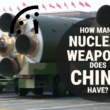Provoking rational fear
By Robert Mtonga, September 26, 2013
Round Two of this discussion has focused on the ways in which humanitarian issues can best be incorporated into arguments that nuclear weapons must be abolished. As co-president of International Physicians for the Prevention of Nuclear War (IPPNW), I am often called upon to make such arguments. In the view of IPPNW, nuclear weapons must be banned precisely because of their humanitarian consequences. But what is surprising, considering the strength of arguments for disarmament, is that these arguments can sometimes elicit negative reactions.
The humanitarian case is easy enough to build. Death on a massive scale is always repulsive, all the more so when its cause is not a natural disaster but rather belligerence or madness. One need only point to Hiroshima and Nagasaki to illustrate the suffering that accompanies nuclear war—the charred bodies, the stare of blinded eyes, the inability of municipal response systems to render help to those who desperately need it. In such a situation, the living might well envy the dead. And this doesn't even take into account longer-term effects of nuclear detonations such as famine, "nuclear winter," new and emerging cancers, and widespread birth defects.
Public health workers, who are all too familiar with explosive force, albeit on a smaller scale than would be generated by a nuclear detonation, are well positioned to contribute to the public discourse on nuclear weapons and their humanitarian consequences. Doctors involved in International Physicians for the Prevention of Nuclear War try to forewarn the world about potential nuclear disaster—to provoke rational fear. This can be done on a scientific level, for instance by presenting studies on skin cancers caused by nuclear fallout. It can be done on a human level, by drawing on the testimonials of Hibakusha (the Japanese word for atomic bomb survivors), including the doctors among them.
All this makes a compelling message. But public health activists can encounter surprising reactions in some audiences. Here I am not referring to warmongers who cynically wave away the evidence that demands a ban on nuclear weapons. Nor am I referring to those in the defense and security realms who use doctrines of deterrence to justify the continued existence of nuclear weapons, or who point out their potential use as bunker busters.
Instead I am referring to those who, when they are reminded of Hiroshima and Nagasaki, argue that those bombings bear no relation to the here and now, that they were one-off events in the distant past. Or those who, when their attention is directed to the suffering of Hibakusha, consider it a repulsive scare tactic. (Some even seem to think that the victims of the atomic bombings, who had dared to fight the mighty United States of America and its allies, deserved their fate.) Public health practitioners who campaign against nuclear weapons can find themselves branded fearmongers or doomsday prophets.
Those who oppose nuclear abolition often point out that nuclear weapons have not been used in war since 1945. But this is pure luck, and luck is never guaranteed to hold. The potential for large-scale or even global annihilation remains real—it's just a mistake away. And unless people can, as Bertrand Russell and Albert Einstein urged them to do in 1955, "remember [their] humanity and forget the rest," mushroom clouds may still spell the end.
Topics: Nuclear Weapons
Share: [addthis tool="addthis_inline_share_toolbox"]














